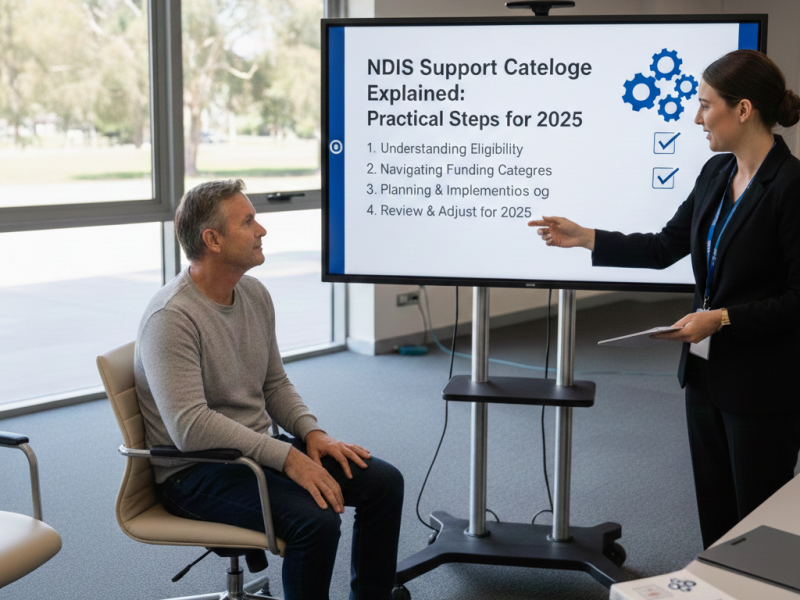The National Disability Insurance Scheme (NDIS) empowers Participants to live more independently, connect with their communities, and achieve meaningful goals. For many, support services involve regular travel—to health appointments, therapy sessions, social events, or education and work. Travel is a vital component of support planning, but it also comes with time and cost. That’s where the NDIS Travel Allowance comes in.
Participants may also receive Transport Funding if they cannot use public transport due to their disability. This personal transport funding is separate and designed to help them pay for taxis, rideshare services, or community transport to reach supports and appointments.
For Support Workers and NDIS Providers, understanding what travel costs can be claimed, and how to claim it correctly, is essential. This guide explains how the allowance works, what’s claimable, and what records need to be kept so you can stay compliant and get paid accurately.
Want to Attract More NDIS Clients?
Get expert advice on how to market your services, connect with clients, and grow your practice.
What is Travel Allowance?
The NDIS Travel Allowance is a type of funding that enables Support Workers to claim reasonable costs of travel incurred when providing services to a Participant. This might involve travel time to or with a Participant and selected non-labour expenses like public transport fares or tolls. The allowance is underpinned by NDIS Pricing Arrangements and must satisfy rigorous requirements, including pre-agreement with the Participant and proper documentation.
For Support Workers, the NDIS Travel Allowance allows certain travel-related costs to be claimed when delivering face-to-face supports to Participants. These travel claims are divided into two main categories under the NDIS Pricing Arrangements: labour costs (time spent travelling) and non-labour costs (expenses like mileage, tolls, or public transport).
In practice, Support Workers will typically encounter three distinct components when claiming travel:
1.Travel to the Participant – time spent travelling directly to the Participant’s location to provide a booked support.
2. Travel with the Participant – time spent accompanying the Participant during travel as part of their support (e.g., going with them to a community activity or medical appointment).
3. Non-labour travel expenses – costs such as kilometres driven in a private vehicle, parking fees, tolls, or public transport fares.
Each of these components has specific rules, limits, and documentation requirements, all of which must be agreed upon in advance with the Participant and clearly detailed in the Service Agreement. Understanding how these parts fit together helps Providers claim correctly and avoid compliance issues.
1. Time Spent Accompanying Participants
Support Workers may accompany Participants during transport when the travel is part of a booked support—for example, attending a medical appointment, community outing, or other goal-related activity. In these cases, the time spent with the Participant is billed at the same hourly rate as the support being delivered.
This time is considered part of the direct support service and must align with the support item listed in the Participant’s plan. It must also be agreed upon with the Participant in advance and documented in the Service Agreement.
2. Travel Time to Participants
Support Workers can claim for time spent travelling to a Participant to deliver a face-to-face support. This is classified as a labour cost and is subject to capped time limits based on location: up to 30 minutes each way in metropolitan and regional areas, and up to 60 minutes in remote and very remote areas.
The travel must be direct, result in a scheduled face-to-face service, and be pre-agreed with the Participant as part of the Service Agreement. Return travel is only claimable if permitted under the worker’s employment conditions and clearly reflected in the Participant’s Service Agreement.
3. Non-Labour Cost of Travel
In addition to labour time, Support Workers may claim certain out-of-pocket travel expenses when delivering supports. These non-labour costs may include the use of a private vehicle (reimbursed per kilometre in accordance with NDIS pricing), road tolls, parking fees, and public transport fares. All such costs must be considered reasonable, directly related to a support, and pre-approved with the Participant.
Workers are responsible for maintaining accurate records, such as receipts and travel logs, and for clearly itemising these charges in invoices using the correct support item codes.
Critical Hints for Recording Travel Time and Expenses
Accurate documentation is imperative for claiming travel expenses under NDIS. There are a few critical hints:
- Use a travel log or app: Document start and finish times, addresses, distance travelled, and trip purpose.
- Billable and non-billable time separately: Only record time that adheres to NDIS standards (e.g., maximum 30 minutes in the city).
- Accurately track kilometres: Utilise your vehicle’s odometer or GPS tracking app to prevent arguments.
- Gather and store receipts: Store toll, parking, or public transport receipts electronically or on paper.
- Ensure Participant agreement: Always negotiate and record travel costs in the Service Agreement to prevent future misunderstandings.
Being diligent with record-keeping ensures compliance, enhances transparency, and lessens the risk of payment disputes or audits.
Referrals Start With Reputation – We’ll Help You Build Both
From networking tips to service refinement, we guide NDIS providers toward lasting impact.
Tips for Claiming Travel Costs
Accurately claiming travel under the NDIS requires careful planning, up-to-date knowledge of the rules, and clear communication with Participants. All travel charges must align with the current Pricing Arrangements and Support Catalogue, and be verifiable by appropriate documentation.
To ensure compliance and avoid disputes:
- Establish Written Agreements: Before claiming any travel costs, ensure that the Participant has agreed in writing (usually through the Service Agreement) to the types of travel expenses that will be charged and the support items they apply to.
- Use the Correct Support Items: Travel costs must be billed against the same support item as the service being delivered. For example, if you are providing community participation, any associated travel should be claimed under that same item.
- Review the Current Pricing Arrangements: NDIS rates and rules change over time. Always check the most recent Pricing Arrangements and Support Catalogue to confirm the current kilometre rate, travel time limits, and relevant item codes.
Provide Clear Invoicing: Invoices should clearly separate labour and non-labour travel costs, with accurate descriptions and matching support item codes. This improves transparency and helps avoid billing issues. - Claim Only What’s Reasonable and Agreed: You can only claim for time and expenses that are actually incurred, within allowable limits, and agreed to by the Participant in advance. Overcharging or applying the wrong line item can result in non-compliance and repayment.
By following these practices, Support Workers and Providers can ensure travel costs are claimed accurately, ethically, and in accordance with the NDIS guidelines.
FAQs
1. How much can a Support Worker charge for travel time?
Support Workers can claim for travel time to a Participant’s location when delivering face-to-face support. The maximum claimable time is up to 30 minutes each way in metropolitan and regional areas and up to 60 minutes each way in remote and very remote areas. Travel time must be directly linked to a booked support session and agreed to in advance with the Participant.
2. How is travel time charged?
Travel time is billed as a labour cost under the same support item as the face-to-face service being delivered. For example, if the support session relates to community access, the associated travel is charged under that same line item. Workers may only charge for travel to a Participant—not from—and only when the travel leads to an eligible support.
3. What types of travel are claimable under the NDIS?
Two types of Provider travel are generally claimable:
- Travel to a Participant, for the purpose of delivering a support session.
- Travel with a Participant, where time spent accompanying them (e.g. to an appointment or outing) is considered part of the service itself.
- Non-labour costs.
Travel must be directly related to the support provided, not incidental or personal, and must be agreed upon in the Participant’s Service Agreement
4. What non-labour costs can be claimed?
Support Workers may claim non-labour expenses such as:
- Kilometres driven in a private vehicle (reimbursed at the NDIS-set per-kilometre rate).
- Public transport fares used to travel for a support shift.
- Tolls or parking fees incurred during service delivery.
These costs must be reasonable, necessary, pre-approved by the Participant, and clearly documented on invoices using the correct support item code.
5. Can travel costs be split between multiple Participants?
Yes. If a Support Worker is delivering group-based support or transporting multiple Participants on a shared journey, the travel time and/or expenses can be proportionally divided. However, all Participants must agree in advance to the arrangement, and the total cost recovered must not exceed what would have been charged for one Participant alone.


